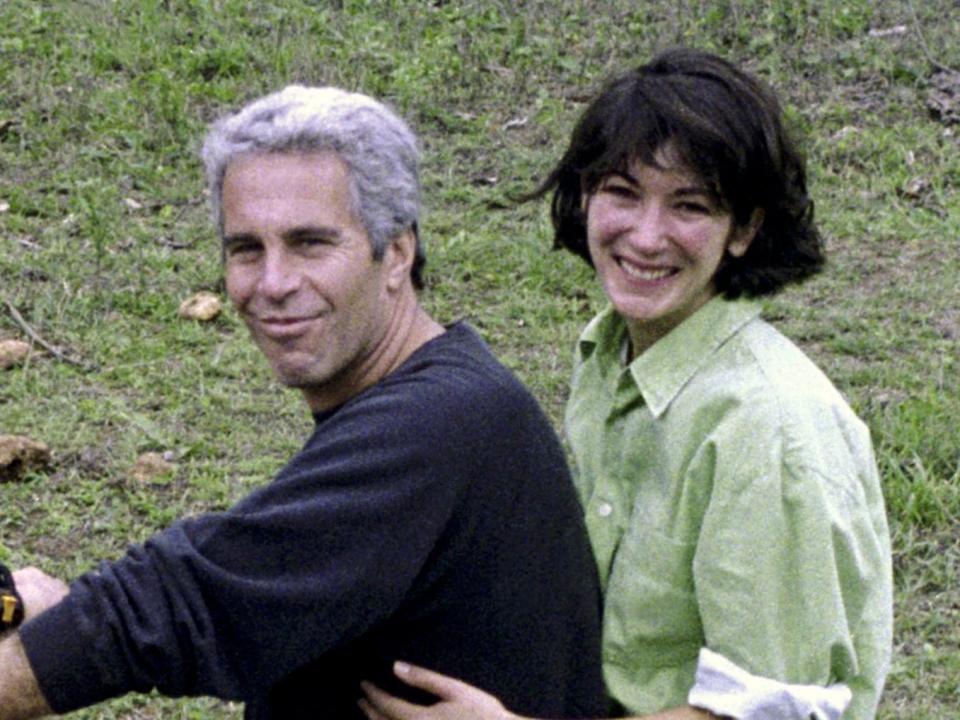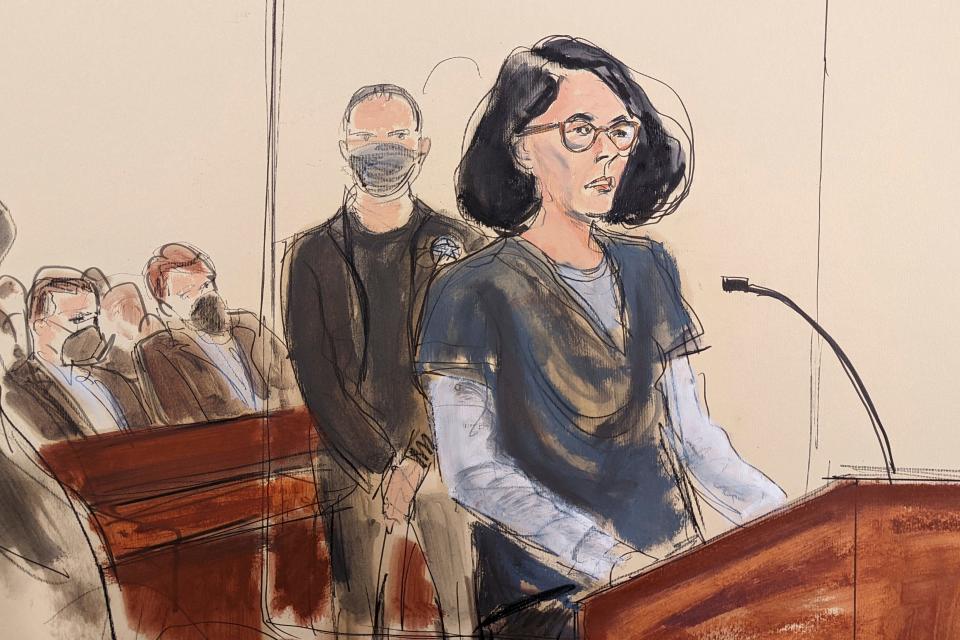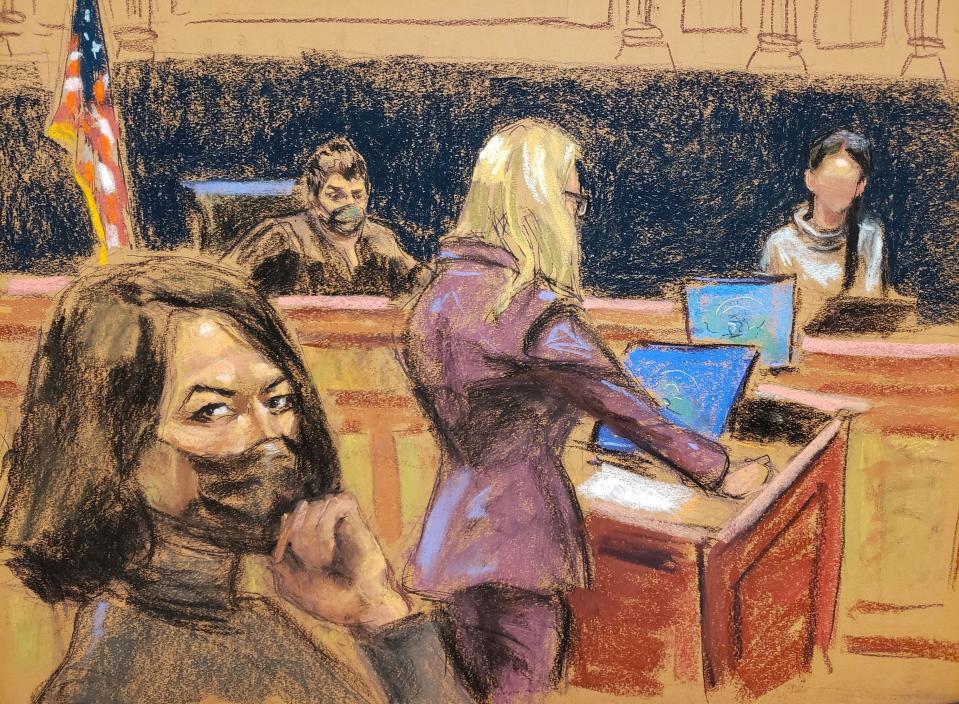Ghislaine Maxwell's lawyers ask judges to overturn her conviction, arguing Jeffrey Epstein's plea deal shields her

Ghislaine Maxwell's lawyers are arguing for her release in a federal appeals court.
The appeal focuses on a nonprosecution agreement between Jeffrey Epstein and federal prosecutors.
If the appeal is successful, Maxwell could be freed and face another trial.
Lawyers for Ghislaine Maxwell — the former Jeffrey Epstein associate convicted of trafficking girls to him for sex — asked a federal appeals court Tuesday afternoon to overturn her conviction and set her free from prison, arguing that a deal Justice Department officials struck with Jeffrey Epstein should have shielded her from being prosecuted in the first place.
The arguments, held in an ornate Manhattan courtroom before a panel of three judges, hinged on a controversial 2007 non-prosecution agreement between Epstein and Alexander Acosta, who then served as the US Attorney for the Southern District of Florida.
Through the agreement, Epstein was permitted to serve a light sentence after pleading guilty to soliciting sex from an underage girl — even though law enforcement officials had concluded that he sexually abused dozens of girls.
Maxwell's lawyers argue that the contract's blanket over "potential co-conspirators" extends to her, and restricts federal prosecutors across the entire United States — not just southern Florida — from bringing a criminal case related to Epstein's sexual abuse.
Ripping up such an agreement would embed "a dagger in the hearts of the trust between the government and its citizens regarding such plea agreements," Diana Fabi Samson, a lawyer for Maxwell, told the judges, of the 2nd US Circuit Court of Appeals.
A jury in Manhattan federal court found Maxwell guilty of sex-trafficking charges in December 2021, four days after her 60th birthday that Christmas. The jurors agreed with the prosecutors' allegations that she groomed four girls for Epstein to rape and, in some cases, sexually abused them herself.
Alison Nathan, the judge who oversaw Maxwell's trial, sentenced her to 20 years in prison and issued a $750,000 fine. In her sentencing remarks, Nathan said Maxwell weaponized her status as a sophisticated adult woman to deceive the girls into trusting her.
"She befriended and developed relationships of trust," Nathan said at the hearing. "She then manipulated the victims and normalized sexual abuse through her involvement, encouragement, and instruction."
Maxwell is serving her sentence in a federal prison in Tallahassee, Florida, and did not appear at the hearing herself. She listened into the hearing remotely, Arthur Aidala, another of Maxwell's attorneys, told journalists after the hearing.
If the judges agree with her lawyers' arguments, Maxwell could be set free and — depending on the ruling — face another trial.
It could force the women who already testified about Epstein's sexual abuse to face testifying again, repeating their experiences to a jury they would hope believed them.
Aidala said the plain language of the contract — binding "the United States" — worked in Maxwell's favor.
He said he believed several Supreme Court Justices — including Justices Samuel Alito, Clarence Thomas, and Neil Gorsuch — would agree with that reading. Different circuit courts understood the relevant precedents in different ways, making the case ripe for the high court to review the case, he said.
"Quite frankly, I hope they aren't scared away by the name of the defendant," Aidala said.
Epstein's nonprosecution agreement and a juror issue complicate the case
The appeal has moved slowly to a hearing. Maxwell retained the firm Aidala Bertuna & Kamins, well known in New York's legal scene for taking on challenging cases, including the appeal for the former film producer Harvey Weinstein's criminal conviction in Manhattan and the defense of former Mayor Rudy Giuliani of New York from disbarment.
Her 113-page appeal brief was authored partly by John M. Leventhal, a former New York state appeals court judge.
Tuesday's hearings exclusively focused on the nonprosecution agreement between Epstein and the Justice Department.
Fabi Samson said Epstein had abided by its terms, but that federal prosecutors in Manhattan violated it by opening an investigation into Epstein in 2018, following a series of Miami Herald articles about the deal. The Herald's reporting led to the resignation of Alexander Acosta from then-President Donald Trump's cabinet, where he was serving as Labor Secretary at the time.
One of the judges, Raymond Lohier, appeared skeptical that Maxwell was covered by the agreement, much less federal prosecutors outside of the Southern District of Florida. But Fabi Samson argued that the Justice Department's own investigation into the Epstein deal, and its manual for plea agreements, suggested Acosta had "plenary authority."
"All US Attorneys have authority to bind other districts," she said.
Andrew Rohrbach, who served as a prosecutor in Maxwell's trial as an assistant US Attorney in the Southern District of New York, said Epstein's contract covered only the Southern District of Florida. The use of "United States" was shorthand for Acosta's district, not the entire Justice Department, he said.
Maxwell's lawyers have found that explanation unsatisfactory. If there were any ambiguities about the scope of the agreement, they argued in court briefs, then the judge should have done some fact-finding about the contract negotiations to figure out what the parties intended by its scope.
The Justice Department's Office of Professional Responsibility later interviewed Florida prosecutors, who said they didn't recall details about the scope of the agreement, but the office never talked to Epstein's lawyers. Aidala claimed one of Epstein's lawyers in the 2007 negotiations was willing to submit an affidavit claiming the agreement covered the entire country.

Maxwell has maintained her innocence. Her attorneys have argued that she was scapegoated by federal prosecutors after Epstein — a fantastically wealthy and well-connected financier who may have sexually abused up to 200 people — slipped through their fingers by killing himself in jail while awaiting trial in 2019 on his own set of sex-trafficking charges.
At her sentencing hearing, Maxwell claimed she was "fooled" by Epstein and said she hoped her "harsh and unusual incarceration" brought his victims some relief.
"Despite the many helpful and positive things I have done in my life, and will continue to do, to assist others during my sentence, I know that my association with Epstein and this case will forever and permanently stain me," she said. "It is the greatest regret of my life that I ever met Jeffrey Epstein."
Aside from the non-prosecution agreement, Maxwell's lawyers have argued the case was marred by missteps in other ways.
They say the abuse the victims testified about was beyond the statute of limitations, and that a rogue juror spoiled the trial by failing to disclose his history as a victim of sexual abuse.
The juror in question — identified as Juror 50 in court documents and Scott David, his first and middle name, in interviews — told members of the media after Maxwell's conviction that he was sexually abused as a child.
Nathan, the judge who oversaw Maxwell's case, summoned the juror to the witness stand in a highly unusual hearing to determine why he omitted that from his juror questionnaire. He said he was bored during the selection process and "flew through" the form. The judge ultimately ruled that the verdict would stand, finding he didn't deliberately lie and wouldn't have been invalidated as a juror.
Aidala told journalists it was "BS" that the juror simply skipped checking the box where he was supposed to disclose his sexual abuse, and that the appeals court should toss out the verdict.

Manhattan federal prosecutors have argued that Nathan followed the proper procedure to handle Juror 50 and that the verdict was sound.
After the trial, Nathan was elevated by President Joe Biden to the 2nd US Circuit Court of Appeals (she took a break from the trial to travel to Washington, DC, for a confirmation hearing) and had no role in the appeal hearing.
While Maxwell is in prison — Page Six reported she ran a half-marathon there and was focusing on yoga, and The Daily Mail said she'd run afoul of inmates she said tried to extort her — lawsuits related to her and Epstein continue to ricochet through the courts.
In January, a judge unsealed thousands of pages of documents related to a lawsuit against her from the Epstein accuser Virginia Giuffre, which shed some light on how his sex-trafficking operation worked.
And last year, JPMorgan Chase and Deutsche Bank, which banked for Epstein, settled class-action lawsuits from his victims and claims from the US Virgin Islands, which had said they ignored red flags and facilitated his sex-trafficking operation.
If the three-judge panel finds that Maxwell's lawyers' arguments have merit, the case may go back to Nathan for a new trial, or for a new sentencing on different terms.
Prosecutors, in the case of a new trial, would have to contend with persuading Maxwell's victims to testify again about the darkest periods of their life.
One of them, Carolyn Andriano, died in August of a drug overdose. She testified during the trial that she became addicted to "cocaine and pain pills" to make Epstein's sexual abuse tolerable.
"Marijuana, cocaine, alcohol — anything that could block out for me to go to the appointment," she said at the trial.
This story has been updated.
Read the original article on Business Insider

 Yahoo Finance
Yahoo Finance 